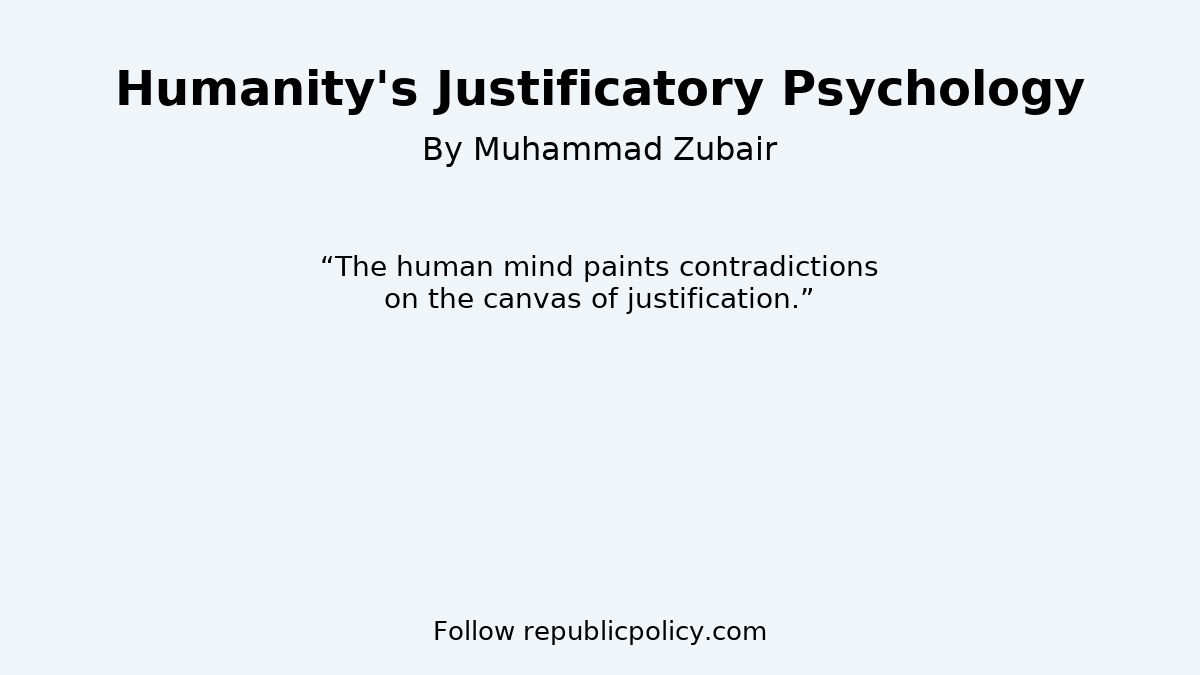Muhammad Zubair
The human mind is a strange factory where fictions of comfort and convenience are spun more often than truths. Leon Festinger probed this factory and discovered that the soul’s greatest enemy is often its own contradiction. When our beliefs, actions, or desires clash, a silent shake occurs within. This anxiety is called Cognitive Dissonance. Yet, to escape this shake, humans immediately build a bridge of justifications. This bridge is sometimes built with stones of logic, sometimes with the clay of self-deception, and sometimes with threads of dreams. Thus, by laying a temporary bamboo bridge over truth’s sharp currents, humans convince themselves they are safe.
Follow Republic Policy Website
The smoker whose veins throb with the craving for tobacco knows he consumes poison, but when knowledge and habit collide, he recounts the story of his neighbour who survived cancer: “So-and-so lived to ninety, smoking ten cigarettes daily!” His mind renders the danger of cigarettes meaningless. This is the first stone of justification: trivializing the threat. Similarly, the love-blinded youth whose beloved has crossed every moral boundary knows the path is wrong, but when friends warn him, he says: “What do you know? You’ve never tasted love!” Here, the method to resolve the contradiction is closing one’s eyes to reality. Dismissing opposing voices as foolish reduces the anxiety.
Follow Republic Policy YouTube
This same psychology operates in religious, political, and social spheres. The religious leader seated on heaps of wealth preaches simplicity. But when conscience protests, he declares: “This is all God’s bounty; I am merely a trustee!” Here, faith itself is twisted to bridge the gap between behaviour and belief. Presenting wealth as a trust soothes the ego. All our schools of thought are prisoners of this justificatory psychology. Certain mystics (or fake Sufis) who neglect religious injunctions say: “The path of asceticism is different; outward adherence to Sharia is not essential. We are not five-time worshippers; we are perpetual worshippers.” This statement transforms the void of action into a spiritual exception. Conversely, some hardline groups reject even genuine mystics under the pretext of fake ones, so they need not breach their ideological walls.
Follow Republic Policy Twitter
Leon Festinger states that justification is humanity’s battle for survival. When we vote for the wrong leader, we say: “They’re all the same!” This very statement renders our choice meaningless. When shopping amidst inflation, we say: “We’ll die someday anyway!” Thus, we evade responsibility. When skipping prayers, we say: “The heart must be pure!” Thus, our imagined inner purity satisfies the neglect of duty. The question is: Is this self-deception bad? Perhaps not. It is our protective instinct. If we exposed every contradiction, we might go mad. Just as a sailor doesn’t set sail against the wind but changes the angle, humans too adjust the angle of their thoughts to continue the journey. But the problem arises when this temporary bridge becomes a permanent tomb for truth.
Follow Republic Policy Facebook
History too reveals such justifications. Andrew Carnegie framed his wealth as a tool for public service to escape capitalism’s contradictions. In our societies, politicians also present personal gain under the banner of national service. The marvel of the human mind is that it paints a picture of contradiction on the canvas of justification, one that allows it to smile. But if these justifications force us to evade truth, this very bridge becomes the soul’s prison.
Festinger invites us to recognize the web of our justifications. Ask yourself: Is what I’m thinking a reason or a heart’s consolation? Man’s greatest battle is with himself, and in this war, justification is undoubtedly our most powerful, yet double-edged, weapon. A distinct trend is evident in our intellectual and religious discourse: every school of thought, confined to its own circle, has mastered justifying its position so thoroughly that the core objective—accessing truth—fades into the background.
Follow Republic Policy Website
Under Justificatory Psychology, humans validate their thoughts, beliefs, or actions through some rationalization, however detached from reality. This process offers temporary solace but ultimately leads to collective stagnation and intellectual decline. All our schools of thought are prisoners of this justificatory psychology. Some juristic groups deem their rulings absolute and dismiss all others as inferior or flawed. One builds a narrative around divine unity, another around love, yet another around action. Each remains confined to this orbit, willingly or unwillingly, without intellectual synthesis.
Follow Republic Policy YouTube
The consequence is that dialogue, inquiry, and open-minded thinking weaken. The courage to tolerate differing opinions and hear new arguments diminishes, trapping individuals and society in a circle from which escape requires first recognizing and mastering one’s justificatory psychology.
















